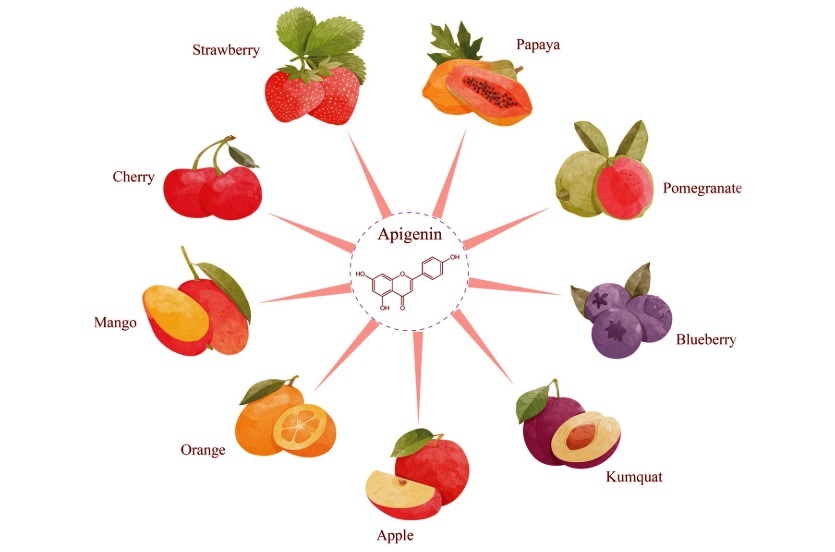Nikhil Prasad Fact checked by:Thailand Medical News Team Feb 12, 2025 2 months, 1 day, 54 minutes ago
Thailand Doctors: A Natural Compound Shows Promise Against Deadly Bile Duct Cancer
Thailand Doctors have made a breakthrough discovery in the fight against cholangiocarcinoma, a deadly form of bile duct cancer. Researchers and from Chulabhorn International College of Medicine at Thammasat University and the Centre for Research and Development of Medical Diagnostic Laboratories at Khon Kaen University have found that apigenin, a natural flavonoid present in many fruits and vegetables, can induce cancer cell death and slow tumor progression.
 Thailand Doctors Discover Potential Cancer Treatment Using Apigenin
Thailand Doctors Discover Potential Cancer Treatment Using Apigenin
Cholangiocarcinoma is highly aggressive, and its late-stage diagnosis often leaves patients with limited treatment options. Conventional chemotherapy, such as gemcitabine and cisplatin, has shown only moderate success, often leading to drug resistance and severe side effects. This Medical News report highlights a recent study exploring the potential of apigenin as an alternative treatment option, providing new hope for patients diagnosed with this devastating disease.
How Apigenin Affects Cancer Cells
In laboratory tests conducted on human cholangiocarcinoma cell lines (KKU-M055), apigenin was found to significantly reduce cancer cell viability. The study showed that the compound worked by causing cell cycle arrest at the G2/M phase, preventing the cells from multiplying. Additionally, apigenin activated apoptotic pathways, leading to programmed cell death in cancer cells while having minimal toxic effects on healthy cholangiocyte cells.
The researchers observed that apigenin treatment triggered both the intrinsic and extrinsic pathways of apoptosis. These pathways involve the activation of key proteins called caspases, including caspase-8, caspase-9, and caspase-3/7. Caspases are enzymes that play a critical role in dismantling cancer cells from within, ensuring that harmful cells are eliminated without damaging surrounding tissues.
Apigenin Also Reduces Cancer Cell Migration
Apart from its cancer-killing properties, apigenin was also found to inhibit the migration of cholangiocarcinoma cells. Cancer metastasis, where cancer spreads to other parts of the body, is a major challenge in treating bile duct cancer. The study’s findings suggest that apigenin could potentially prevent the spread of cancer, making it a valuable addition to existing treatments.
A laboratory technique known as the Transwell migration assay was used to assess the effect of apigenin on cancer cell movement. The results showed a significant reduction in the ability of cancer cells to migrate after being treated with the flavonoid, reinforcing its potential role in preventing cancer metastasis.
Future Implications for Cancer Treatment
While the findings from this study are promising, researchers emphasize the need for further studies, including animal models and clinical trials, to confirm apigenin’s effectiveness in real-world applications. If proven successful, apigenin could become a safer and more natural alternative to conventional chemotherapy, redu
cing the severe side effects often associated with cancer treatments.
The study also opens the door for further exploration of other naturally occurring compounds with similar anti-cancer properties. The hope is that in the future, plant-derived compounds could be used alongside standard cancer treatments or even as primary treatment options for certain cancers.
Conclusion
The findings of this study indicate that apigenin has significant potential as a chemopreventive agent for cholangiocarcinoma. By halting cancer cell growth, triggering apoptosis, and reducing cell migration, apigenin may serve as an effective natural alternative to current treatment methods. Furthermore, its selective toxicity towards cancer cells while sparing healthy cells makes it a compelling candidate for future research.
Thailand Doctors have taken a significant step toward finding better treatment options for bile duct cancer, and further research could bring these findings closer to clinical use. If proven effective in future trials, apigenin could revolutionize the way this aggressive cancer is treated.
The study findings were published in the peer-reviewed journal: Toxics.
https://www.mdpi.com/2305-6304/13/2/112
For the latest on
Thailand Doctors, keep on logging to Thailand Medical News.
Read Also:
https://www.thailandmedical.news/news/indonesian-and-malaysian-researchers-find-that-the-phytochemical-apigenin-shows-promise-in-managing-long-covid
https://www.thailandmedical.news/news/thailand-medical-researchers-identify-new-biomarkers-acsl4-slc7a11-and-chac1-for-improved-cholangiocarcinoma-prognosis
https://www.thailandmedical.news/news/researchers-develop-new-treatment-protocol-for-drug-resistance-advanced-bile-duct-cancer
